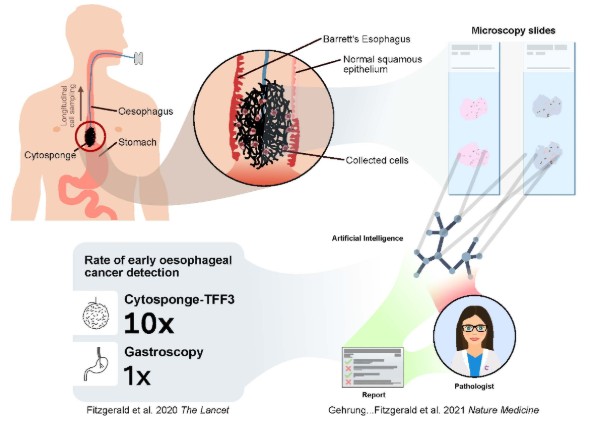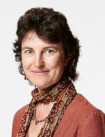Biography
Rebecca Fitzgerald is Professor of Cancer Prevention at the University of Cambridge and Director, Early Cancer Institute.
She still practices medicine as an Honorary Consultant in Gastroenterology at Addenbrooke's Hospital, Cambridge.
She still practices medicine as an Honorary Consultant in Gastroenterology at Addenbrooke's Hospital, Cambridge.
She studied Medicine at Cambridge University and gained her MD in 1997 following a period of research at Stanford University, California, with Professor George Triadafilopoulos. Her postdoctoral training took place at the Department of Adult and Paediatric Gastroenterology, St Barts and The Royal London School of Medicine and Dentistry with Professor Michael Farthing, funded by an MRC Clinician Scientist award. She returned to Cambridge in 2001.
The focus of her research group is to improve methods for early detection of oesophageal cancer through better understanding of the molecular pathogenesis. Rebecca was awarded the prestigious Westminster medal and prize for her first proof-of-concept work on the CytospongeTM and associated assays for diagnosing Barrett’s oesophagus in 2004. Since then this work has received an NHS Innovation prize (2011) and the BMJ Gastro team of the year award (2016). She received a Lister Prize Fellowship in 2008 and in 2013 was awarded an NIHR Research Professorship to facilitate translational research for patient benefit. She was elected a Fellow of the Academy of Medical Sciences in 2013. In 2018 she received the Jane Wardle Prevention and Early Diagnosis Prize, and in 2021 the Don Listwin Award for Outstanding Contribution to Cancer Early Detection.
Rebecca has a plethora of teaching experience and is a Member of the Institute of Learning and Teaching. She is Director of Medical Studies for Trinity College Cambridge, where she is involved with undergraduate and clinical teaching. She has a wealth of lecturing experience including radio broadcasts for BBC Radio 4 and ABC Radio Australia, Health of the Nation. Rebecca is committed to bringing research advances into clinical practice and inspiring other researchers to do likewise.
Research
The Fitzgerald Group is passionate about finding innovative ways to detect cancer at an early stage. We particularly focus on oesophageal and gastric cancer which together account for a substantial cancer burden worldwide. Oesophageal cancer is one of the most deadly cancers with a 5 year survival of under 20%. In order to develop new solutions for diagnosing individuals at high risk for oesophageal and gastric cancer we are a highly inter-disciplinary group spanning: epidemiology and public health; cell and molecular biology; computational biology; clinical trial expertise; and collaborative work in machine learning, physics and chemical engineering.
Our main research aims are to:
- Understand the underlying clinical, genetic and cell environmental factors that lead to the conversion of a low-risk pre-malignant state into invasive cancer.
- Develop and evaluate new diagnostic tools that will identify those patients who are at an increased risk of developing cancer.
- Improve the molecular characterisation of oesophago-gastric cancer to inform patient management.
Key areas of interest:
- CRUK Cambridge Centre research programme(s): Early Detection
- Tumour type/site: Oesophago-gastric
- Methods & technologies: Multi-omics and integration with clinical data, single cell sequencing, patient derived organoids, machine learning, devices, biomarkers
We have a pragmatic approach to research which comes from a working knowledge of the clinical disease with the aim of translating our research findings into clinical practice. Our most notable success has been in developing the Cytosponge-biomarker technology all the way from concept through to large scale clinical trial and implementation.
cytosponge-illu_fitzgerald_page2.jpg

- https://cambridgebrc.nihr.ac.uk/the-cytosponge/
- https://www.nice.org.uk/advice/mib240/chapter/The-technology
- https://news.cancerresearchuk.org/2020/07/31/a-sponge-on-a-string-test-to-detect-oesophageal-cancer-earlier/
Open/ongoing Clinical Trials

